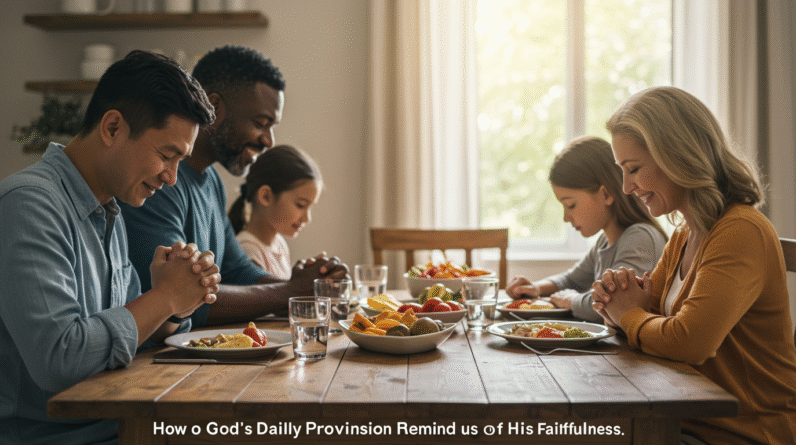God’s Daily Promise Of Peace In A Stress-Filled World
You live in a world that moves fast, demands much, and constantly competes for your attention. Stress shows up at your doorstep in many forms — deadlines, financial pressure, family tensions, health worries, and the constant barrage of bad news. Yet the Bible speaks into that reality with clear, practical promises. This article is written to help you receive and live in God’s comfort amid life’s storms. You’re going to see how God’s Word offers everyday practices and spiritual anchors so that peace becomes less of a rare experience and more of your daily reality.
Why peace matters in your daily life
Peace isn’t just a pleasant emotion; it’s a spiritual resource that affects how you think, feel, and act. When you experience peace, you make better decisions, relate to others with more grace, and face setbacks with resilience. The Bible describes peace as a fruit of the Spirit (Galatians 5:22) and as the stabilizing presence of God in your life. Learning to access that peace is like learning to breathe — simple in theory, but practice makes it real. You’ll find that God’s peace often comes through straightforward disciplines: prayer, Scripture, trust, and community.
The promise of peace in Scripture
One of the first places you’ll want to turn is Jesus’ own words. He said, “Peace I leave with you; my peace I give you.” That wasn’t a polite suggestion — it was a provision from the Savior. Read it, meditate on it, and let it sink into your soul: John 14:27. The Bible is filled with similar promises that meet the practical needs of your anxious heart in a stress-filled world.
Understanding stress through a biblical lens
You’re not abnormal for feeling stressed. Scripture recognizes human frailty and offers compassion along with direction. When you feel anxious, the Bible doesn’t tell you to harden your heart or pretend everything is fine. Instead, it teaches you to bring your worries to God and to replace rumination with trust. For instance, the apostle Paul wrote about exchanging anxiety for prayer and experiencing the peace of God as a guard for your heart and mind. This is not merely pa ersonal pep talk — it’s a spiritual exchange you can make daily.
Why your stress is also a spiritual issue
Stress becomes a spiritual issue when it crowds out your trust in God or when it drives you to unhealthy coping mechanisms. The Bible invites you to transfer the burden from your own limited shoulders to God’s capable hands. When you do that, the pressure shifts. That transfer is an essential element of living in God’s peace; it’s not about denying reality but about reorienting who’s in control of it.
Key biblical promises that meet your anxiety
There are particular promises in Scripture that are like keys for your anxious moments. They’re not vague platitudes — they’re specific statements from God that you can claim and apply. Below are several promises to store in your heart and practice daily.
Jesus’ gift of peace: John 14:27
Jesus gave a personal and practical promise: “Peace I leave with you; my peace I give you.” Read it slowly and let it sink in: John 14:27. When you feel inner turmoil, remind yourself that the peace you need originates in the character and presence of Jesus. That peace isn’t dependent on your circumstances; it’s a gift from him.
Prayer and peace: Philippians 4:6–7
The apostle Paul gives a simple rhythm for today’s anxious person: don’t be anxious; instead, pray and give thanks. When you do, “the peace of God, which transcends all understanding, will guard your hearts and your minds.” Read it here: Philippians 4:6-7. That peace acts like sentries at the gates of your heart and mind, watching over what tries to enter. Prayer is not a panic button; it’s a lifeline that connects your worry to God’s sovereignty.
Trust and steady mind: Isaiah 26:3
Isaiah makes a powerful promise to those who trust and keep their minds focused on the Lord: “You will keep in perfect peace those whose minds are steadfast, because they trust in you.” See it here: Isaiah 26:3. This verse doesn’t promise the removal of stress, but it promises a steady peace when you fix your heart on God. In other words, your focus determines your peace.
Rest for the weary: Matthew 11:28–30
When you’re carrying heavy loads — expectations, sins, responsibilities — Jesus invites you: “Come to me, all you who are weary and burdened, and I will give you rest.” Read his invitation here: Matthew 11:28-30. This rest is not a temporary nap; it’s a posture of dependence and surrender. You stop trying to control everything and start trusting in Jesus’ gentle leadership.
God’s care and strength: Psalm 29:11
You need to know that God cares and strengthens you. The psalmist declares, “The LORD gives strength to his people; the LORD blesses his people with peace.” See the encouragement here: Psalm 29:11. This is a communal promise as well as a personal one — God’s blessing of peace extends to you as part of his family.
Casting your cares: Psalm 55:22
When anxiety feels heavy, the Bible gives a practical command: cast your burden on the LORD. “Cast your cares on the LORD and he will sustain you; he will never let the righteous be shaken.” Read it here: Psalm 55:22. Casting is an action — you actively hand your worries to God and trust him to carry them.
Trust in action: Proverbs 3:5–6
For a day-to-day application, Proverbs instructs you: “Trust in the LORD with all your heart and lean not on your own understanding; in all your ways submit to him, and he will make your paths straight.” See the wisdom here: Proverbs 3:5-6. Trust is not passive; it’s a discipline that helps you live with confidence and clarity.

How to make God’s promises practical each day
Scripture is full of assurances, but you’ll need practical patterns to walk them out. Here are daily practices that anchor you in God’s presence and cultivate peace in the ordinary moments of your life.
Start with a morning habit of Scripture and prayer
Begin your day by reading a short passage and praying specifically over the pressures you expect to face. This rehearsal of faith prepares you to respond to stress differently. Even five minutes of focused Scripture and prayer can change how you handle a crisis. Use a verse like Philippians 4:6-7 as your morning anchor.
Practice the art of handing over (cast your cares)
When anxiety arises, take a physical action to accompany your spiritual action. Speak your worries out loud and say, “Lord, I cast this to you,” echoing Psalm 55:22. Making the act concrete helps your heart loosen its grip on the worry.
Use breath prayers in moments of acute stress
A breath prayer is a short, biblically shaped phrase you pray in rhythm with your breathing. For example: inhale with “Lord, I come” and exhale “I rest in you.” These short prayers help you practice the rest Jesus offers in Matthew 11:28-30 and bring your focus back to him.
Memorize and meditate on key verses
Memorizing Scripture is like stocking your emergency peace supplies. When stress hits, your mind reaches for what’s there. Make it a habit to memorize verses like John 14:27 and Isaiah 26:3. Repeating them quietly calms your thoughts and reorients your heart.
Practice gratitude to reframe your perspective
Stress narrows your view to the problem. Gratitude widens it back out to God’s goodness. Write down three things you’re grateful for every evening. This simple habit trains your mind to notice God’s blessings even amidst hardship, which lines up with the biblical call to give thanks in prayer Philippians 4:6-7.
Build rhythms of rest and Sabbath
You weren’t made to be always on. God designed rest as an integral part of spiritual life. Schedule regular times of rest and renewal and treat Sabbath as a spiritual practice that protects your well-being. Jesus’ promise of rest in Matthew 11:28-30 is meant to shape how you live, not just what you believe.
How trust changes your brain and behavior
You should know that practicing trust and peace has neurological and psychological effects. When you consciously replace worry with prayer and gratitude, you’re creating new pathways in your brain. That means over time you’ll find it easier to respond to stress with calmness rather than with panic. This is part of what Scripture promises when it talks about God guarding your heart and mind — your inner life gets reshaped as you repeatedly apply spiritual truth.
The cycle of rehearsal and transformation
You change by repeating spiritual disciplines until they become habits. Start small: five minutes of prayer, one breath prayer in a stressful moment, a short Scripture memorization. Gradually build those habits and you’ll notice different responses to the same stressors. The repeated practice of trusting God reflects what Proverbs 3:5-6 teaches: leaning on God rather than your own understanding gradually changes how you interpret life.
When peace doesn’t come right away
You may wonder why peace sometimes feels delayed even after you pray. That’s a fair question. Peace in your heart doesn’t always arrive the moment you pray like a magic switch. Sometimes God’s peace grows as you process, wait, and mature in faith. The presence of ongoing stress doesn’t mean God is absent or that his promises are false. It may mean God is working in ways that take time to reveal.
How to hold on when peace feels distant
When peace feels distant, keep doing the small practices. Keep meeting God in the Word and in prayer, keep surrendering burdens, and keep staying connected to Christian community. The Bible calls you to perseverance. Remember the promise that God strengthens his people and blesses them with peace Psalm 29:11. Trust is often a long obedience in the same direction.
Community as a channel of peace
You were not meant to carry life’s burdens alone. The body of Christ is a tangible way God brings peace to you through others. A friend who listens, a pastor who prays with you, a small group that reminds you of God’s faithfulness — all these are means of grace that help you experience the promises of Scripture in practical ways. Share your burdens, accept help, and offer help in return. Mutual care is a biblical way of living out God’s promise to bless his people with peace Psalm 29:11.
Practical ways to connect for peace
Find a trusted friend for weekly check-ins, join a small group for encouragement, and make space for accountability in your spiritual life. These relational rhythms keep you honest and supported when anxiety makes you want to isolate. Community reminds you that God’s work often comes through human connection, just as Scripture describes God’s people as the instruments of his care.

Dealing with chronic anxiety and when to seek help
If your anxiety is persistent or debilitating, Scripture’s promises still apply, but it’s wise to combine spiritual help with professional care. God often uses trained counselors, doctors, and support groups to bring healing. Seeking professional help doesn’t mean you lack faith; it means you’re wisely stewarding the resources God has given for health. The Bible acknowledges human limitations and encourages you to seek wise counsel and support.
Integrating spiritual and professional care
Pray for wisdom as you pursue therapy or medication, and share your spiritual values with your care team so treatment aligns with your faith. Continue the spiritual disciplines that keep you anchored — prayer, Scripture, community — while receiving professional help. You’re cooperating with God’s provision in multiple ways.
Stories of peace in everyday life
Real people find peace in ordinary ways. Maybe you’ll be the person who finds calm while driving through a storm after praying a breath prayer. Or maybe peace will come through a friend’s phone call in the middle of the night. These are ordinary testimonies of God’s presence. The Scripture insists that God’s peace is active and practical, not merely theoretical. When you look for these small moments, you’ll discover that God’s care shows up daily in ways both subtle and profound.
How to notice God’s peace in small moments
Take time each evening to reflect on your day and note two moments where you sensed God’s calm. This practice trains your heart to recognize God’s movement. Over time, you’ll grow more aware of how God’s presence produces small but steady peace, consistent with the biblical invitation to trust and rest.
Practical plan: a 7-day starter for peace
Here’s a simple one-week plan to help you begin living in the promises of Scripture. Each day has a focused practice designed to build spiritual rhythms that lead to peace.
Day 1: Read John 14:27 and memorize the key phrase. Pray for Jesus’ peace to enter your heart. Day 2: Practice a five-minute breath prayer when you feel tension. Repeat a short Scripture phrase like Isaiah 26:3. Day 3: Write down three things you’re thankful for and pray through each item, thanking God as in Philippians 4:6. Day 4: Cast a worry to God aloud, as suggested by Psalm 55:22, and notice the relief that follows. Day 5: Rest intentionally for an hour — no screens, just quiet — practicing the rest Jesus offers in Matthew 11:28-30. Day 6: Share a stress with a trusted person and invite prayer, reflecting the communal blessing of Psalm 29:11. Day 7: Reflect on trust by journaling where God has guided you in the past, connecting to Proverbs 3:5-6.
Repeat this cycle and adapt it to fit your life. These practical steps help you internalize the promises that point you to God’s presence.
Living long-term in God’s peace
Peace isn’t an achievement you check off; it’s a life you cultivate. Over time, the disciplines become habits and the promises become more real. Keep practicing prayer, Scripture, gratitude, rest, and community. Keep bringing your anxieties to God and letting others support you. God’s peace is not a one-time miracle for most people — it’s a steady, kind work of God’s Spirit in your life.
Your part and God’s part
Your responsibility is faithful practice: pray, read the Bible, rest, and trust. God’s responsibility is to fulfill his promises: to guard, to strengthen, to grant peace. When you do your part and trust God to do his, you align with the biblical pattern that brings peace to the anxious heart.
Conclusion: claim the promise and practice the presence
You can live with a steadier heart even in a hectic world. Scripture doesn’t promise a life free from all stress, but it does give you a reliable promise of help, rest, and peace from the Lord. When you intentionally apply what Scripture teaches — through prayer, trust, community, and rest — you’ll experience God’s calming presence in tangible ways. Remember, Jesus left you his peace as a gift: receive it, practice it, and share it with others.
God’s promise of peace is not an abstract theological idea; it’s a daily reality you can receive and live out. Make room for these disciplines in your life, and watch how God’s peace begins to reorder your days.
God’s promise of peace will meet you where you are when you reach for him with a humble, open heart. God’s promise of peace is a living, breathing reality designed to guard your heart and mind. God’s promise of peace becomes more real when you practice surrender, rest, and gratitude. God’s promise of peace is often experienced through Christian community and through the simple act of casting your cares on the Lord. God’s promise of peace isn’t a one-time event but a lifelong journey of trust and obedience. God’s promise of peace waits for you each morning as you open Scripture and pray.
Explore More
For further reading and encouragement, check out these posts:
👉 7 Bible Verses About Faith in Hard Times
👉 Job’s Faith: What We Can Learn From His Trials
👉 How To Trust God When Everything Falls Apart
👉 Why God Allows Suffering – A Biblical Perspective
👉 Faith Over Fear: How To Stand Strong In Uncertain Seasons
👉 How To Encourage Someone Struggling With Their Faith
👉 5 Prayers for Strength When You’re Feeling Weak

📘 Jesus and the Woman Caught in Adultery – Grace and Mercy Over Judgement
A powerful retelling of John 8:1-11. This book brings to life the depth of forgiveness, mercy, and God’s unwavering love.
👉 Check it now on Amazon
As a ClickBank Affiliate, I earn from qualifying purchases.
Acknowledgment: All Bible verses referenced in this article were accessed via Bible Gateway (or Bible Hub).
“Want to explore more? Check out our latest post on Why Jesus? and discover the life-changing truth of the Gospel!”








